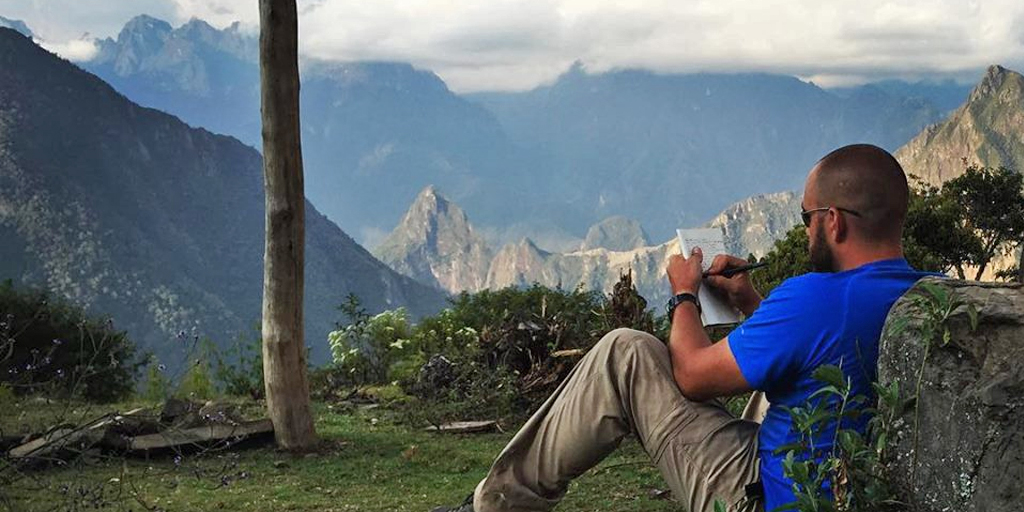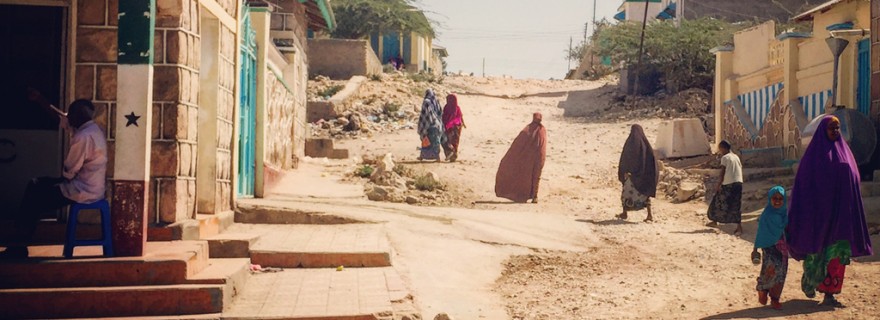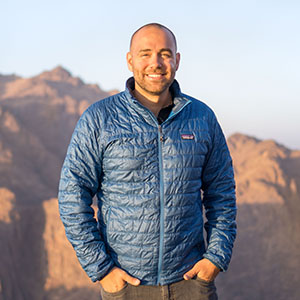goKonrad’s life lessons from travel.
Travel changed me. No surprise there, it changes most people. But after nearly 100 countries, 1 million miles, and several years of my life abroad, how has it changed me? What life lessons – for both life and work – did I pick up on the road? I explored this question deeper to determine the life lessons I gained directly from travel and how it has tangibly changed my life.
1. I make it a habit to set aside time each day to walk, think, and explore
To discern what is truly essential we need space to think, time to look and listen, permission to play, wisdom to sleep, and the discipline to apply highly selective criteria to the choices we make. – Greg Mckeown, Essentialism
Despite the level of self-importance many people gain from being busy, it’s usually a symptom of lazy thinking and not being in control. A full schedule is actually one of the most destructive forces for being your most effective (and happy) self. It forces you to be reactive to everyone else’s expectations instead of being proactive with what’s most essential for your life and work. How can you figure out how to fulfill your dreams or change the world if you’re simply trying to squeeze in time after all the emails, meetings, errands, projects, social commitments, and new TV seasons? I say this with humility as I have been a longtime self-imposed victim of busyness myself.
However, I noticed my default schedule changes when I am traveling. Since I am out of sight and mind for most people, I can better control my schedule and to-do list. I have a built in excuse for not saying yes to requests. While exploring each new city, I go for long walks and wander down any path that looks interesting. I observe different sights, smells, sounds, and tastes. I become uniquely present. This is my form of meditation and it always invigorates my mind and creativity. I begin to ponder questions about the best use of my time and what I should add or eliminate. I think about clever ways to achieve my goals faster or make them significantly bigger. This space is responsible for nearly all of my most important ideas and breakthroughs.
I became addicted to this feeling while traveling, but I later realized I could do it anywhere, any day. Meditative exploration is now a regular part of my routine. I try to take a walk in a new neighborhood or on an unfamiliar street every day. At a minimum, I simply sit in a chair by myself, without a phone or computer, and think. Even if I have a lot to do, taking the time to step away makes me significantly more efficient and effective. Take 1 hour to walk around a new neighborhood today and see what I mean.
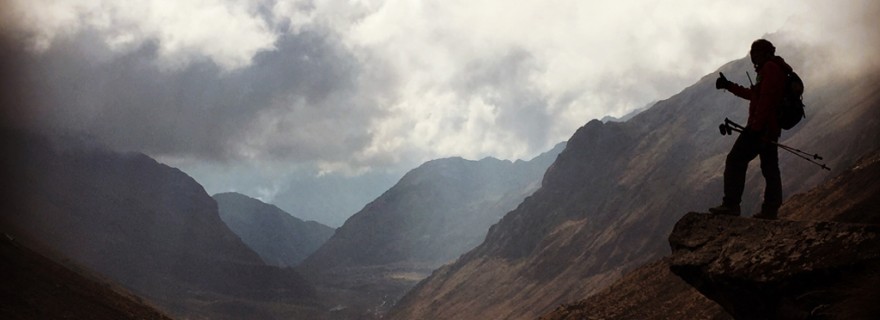
2. I invest in the art of hospitality
Hospitality is how we show how much we value people.
Travel constantly puts me on the receiving end of hospitality. Generous locals and friends around the world have fed, guided, and hosted me. Even those with little to give, often wouldn’t accept my polite refusals or offers for payment. As undeserving and humbling as the unbounded kindness often feels, there is a special connection you feel from someone who is enthused by your presence, goes out of his or her way to make you feel welcomed, and has fun sharing stories late into the night over wine, beer, coffee, tea, or whatever is the country’s spirit of choice.
I now go even further out of my way to invite others into my home, make them feel comfortable, and ensure they have a good time. It’s not always possible, but I have adopted the “visitors are a gift from God” mantra that I’ve heard so many times around the world. I find joy being able to slowly payback the universe for all the hospitality I received as a traveler.
A few small actions can go a long way with hospitality. If you know someone traveling to your city, always invite them to stay with you. If a friend (or stranger) is visiting, prepare an impressive meal and make sure to have their favorite beverage in stock. Don’t let them turn down seconds. Take them somewhere you know they’ll love. Show how much you value them through your actions.
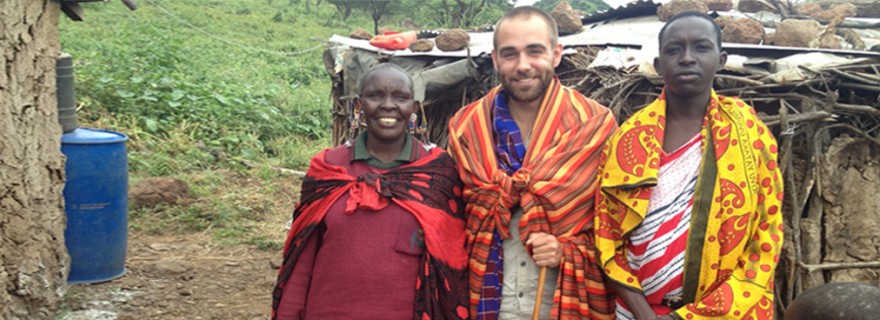
3. I talk to more strangers
There are no strangers here, only friends you haven’t yet met. – William Butler Yeats
I find it easy to slip into a more open personality while on the road. I’m on an adventure, in less of a hurry, and eager to meet locals and fellow travelers. People are often a defining part of any travel experience, so I embrace and seek random encounters and conversations.
When back in my hometown, in contrast, I often didn’t know the person in the next apartment. I minded my own business in cafés, since I usually had work to do, something to read, or a friend already on his or her way. I had extrovert and introvert tendencies, but these personality traits seemed to be geographically biased.
After traveling more and more, I began to incorporate these random and frequent interactions into my daily stateside life. I talk to the person standing next to me in line. I try to be friendly to the next table at a restaurant. I talk longer with the barista. These are all small gestures, but I feel more connected to people and my surroundings. I don’t have to be in a foreign land to be my most curious and friendly self. I learn something new every day, make friends, and enjoy life more by maintaining a traveler’s mindset at home.
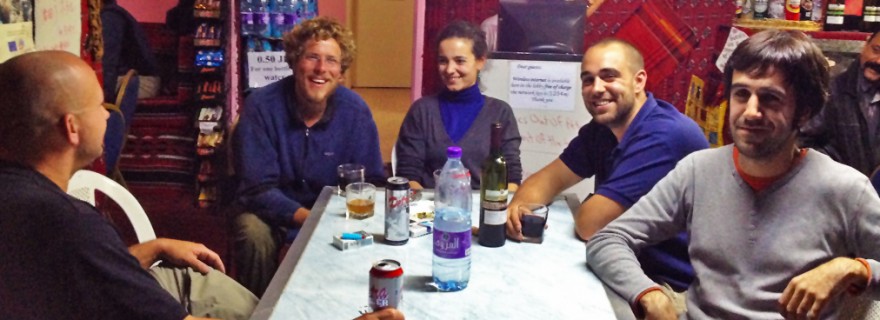
4. I keep the birth lottery in perspective
Where, when and to whom you are born and the society into which you are born will influence your life chances. – Future Learn
I used to take pride in my work ethic and critical thinking. I took risks and made a few smart decisions that paid off. I was the author of my life and could write whatever story I wanted. While this true to a small extent, travel has taught me that the majority of what I’ve been able to do has had very little to do with me. It’s almost purely based on the circumstances of my birth. Lifestyle design looks very different in an Indian slum, African village, or Syrian refugee camp. I’m one of the lucky winners of the birth lottery, which I had no way of influencing.
3 billion people (nearly half the world) live on less than $2.50 per day. 22,000 children die each day because of poverty. 1 in 3 people don’t have access to a toilet. 1 in 10 people don’t have access to clean water. 2 in 3 people don’t have access to the internet. 9 in 10 people live in countries without a free press. Over 60 million girls are forced into child marriages, and millions more are denied access to basic education and political participation. There nearly 30 million people trapped in slavery.
I’ve heard these sobering facts my whole life, but living and traveling in the developing world made me see these facts as people, not statistics. The reason I’m excluded from these stats, is because I simply happened to be born as a white male in the United States. The fact that my parents were political refugees who had the courage and luck to immigrate to the U.S. before I was born further reduces any arrogance or self-righteousness I have from my position in the world.
Any life has its struggles, but this perspective makes me more humble and gracious. I realize my position in the world is a lucky anomaly. This perspective enables me to have minimal material desires and rarely complain. It prevents me from being envious of those around me. It eliminates my excuses to make a difference in the world. It gives me the opportunity – and responsibility – to help others.
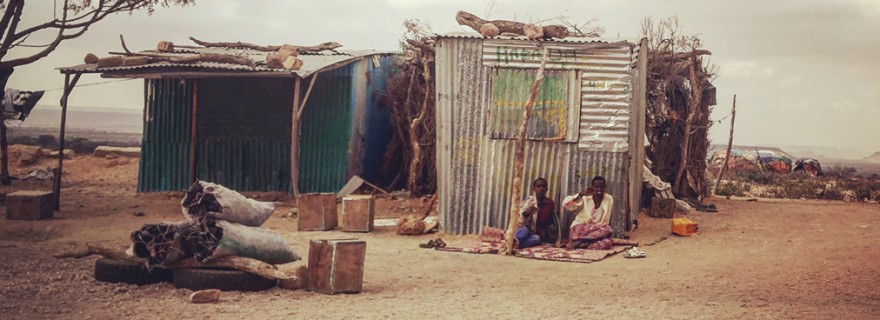
5. I work to create a life I don’t need a vacation from
Life is a picture, but you live in a pixel. – Tim Urban
I like to think about the future and work hard towards it. Unfortunately, this led me to undervalue the present. Every new experience or accomplished goal was short lived and quickly led to whatever was next on the list. Today was merely my building block for tomorrow.
Travel has a way of pulling me out of this. I feel like a child experiencing the world for the first time. Even the most mundane errands can be interesting, require an adventure, and teach me something about the world.
I explored this reluctance to be present when one of Tomorrow’s dreams became Today. After months of coordinating location independence in my business and wanderlusting about the places I could go, the date finally arrived. I was able to do whatever I wanted and wherever I wanted to do it. Sitting on a porch in Uganda, without any plans or urgent work projects, I asked myself one of the most difficult questions, “so what do I really want to do?” There was no more dreaming for the elusive freedom, it was here, and I actually had to decide (not dream about) how I wanted to spend my liberated day.
Live a life you don’t need a vacation from.
Ever since, I have been on a quest to combine passion, purpose, and enjoyment into my daily life. I try not to do anything simply out of obligation or because it may pay off “one day.” I wake up every day excited to work hard on problems I want to solve and to try to create value in the world with things that have a purpose beyond myself. I’m intentional in choosing the people I work and spend time with. I focus on creating the best daily grind and journey for me.
I also began to incorporate small adventures into my routine and look at daily tasks with the same intrigue as when I’m traveling. As Alastair Humphreys said, “Adventure is only a state of mind. Adventure is stretching yourself; mentally, physically or culturally. It is about doing what you do not normally do, pushing yourself hard and doing it to the best of your ability.” While exotic travels force you into this mindset, travel is not required to experience this every day.
Life is a collection of nows. Mundane weekdays actually make up life. Today is all we have, so make it your masterpiece.
“If you live for the weekends and vacation, your shit is broken”
– Gary Vaynerchuck
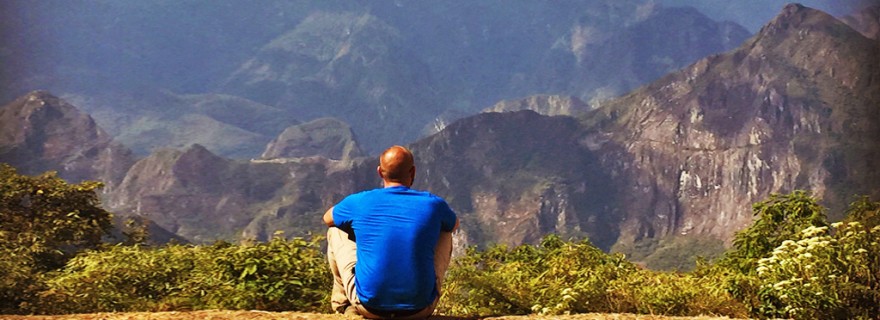
6. I am much more environmentally conscious
We are the first generation to be able to end poverty, and the last generation that can take steps to avoid the worst impacts of climate change. Future generations will judge us harshly if we fail to uphold our moral and historical responsibilities. – Ban Ki-moon, United Nations Secretary-General
I have a confession. I used to not pay much thought to our planet. I understood the scientific community’s dire predictions – intellectually, at least – and knew climate change was a big deal, but my daily actions were minimally impacted.
Traveling throughout the developing world has made my intellectual understanding a lot more tangible. I see glimpses of how our future will likely look, and it’s pretty scary. In many large developing cities, the air is barely breathable. Trash is everywhere because the consumption far exceeds the resources to sufficiently handle it. Political turmoil and conflict are being created by the lack of food and/or drinkable water due to higher temperatures, changes in precipitation patterns, and increased weather-related disasters.
This isn’t some far-off problem, the effects of climate change are happening now. The world’s industrialization and lack of standards are creating unsustainable pollution levels. Billions in the developing world will be impacted first, wiping out decades of progress in the fight against poverty, hunger, disease, and conflict. If you fast forwarded population and economic growth, it’s not hard to visualize the entire world resembling the images I described above. This firsthand glimpse of how we’re quickly destroying the world we love has made me a lot more environmentally conscious.
It will take massive technological innovation and international cooperation to solve this crisis, but I’m further convinced it needs to be one of our top priorities. Our future is at stake. On a personal level, this has led me to leave a smaller footprint. I consume less, recycle more, reuse more, walk more, shop more consciously, vote differently, and waste less water.
“The violence that exists in the human heart is also manifest in the symptoms of illness that we see in the Earth, the water, the air, and in living things.”
– Pope Francis
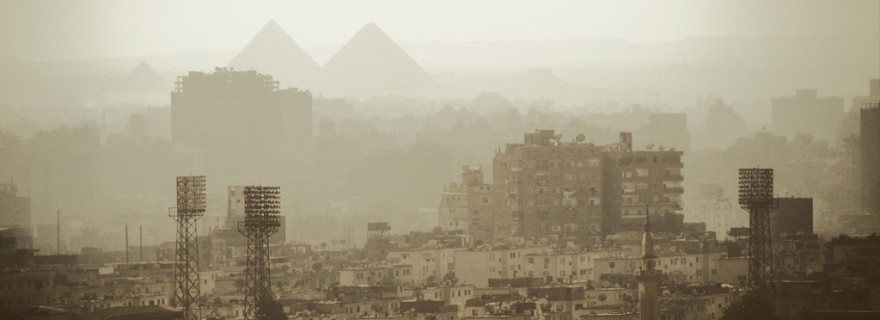
7. I replicate time zone black outs to do my most essential work
I’ve been asking people this question for about 10 years: “Where do you go when you really need to get something done?” I’ll hear things like, the porch, the deck, the kitchen. I’ll hear things like an extra room in the house, the basement, the coffee shop, the library. And then you’ll hear things like the train, a plane, a car — so, the commute. And then you’ll hear people say, “Well, it doesn’t really matter where I am, as long as it’s early in the morning or late at night or on the weekends.” You almost never hear someone say, “The office.” But businesses are spending all this money on this place called the office, and they’re making people go to it all the time, yet people don’t do work in the office. – Jason Fried, co-founder of 37Signals and author of Rework
People often ask how I stay productive while traveling, especially when I’m several time zones away. I was worried about this when I first started, but here’s the reality: I’m actually much more productive.
For at least half of my work day, there are no calls, meetings, random disruptions, instant messages, or incoming emails to distract me. All of these can be productivity killers, especially as you start to get into your flow. With these distractions removed, I’m able to quickly get in and stay in the zone. I can spend hours focused on a challenging problem or take the time to think creatively instead of simply rushing through a deliverable.
Scheduling blocks of isolation time isn’t a new productivity concept, but it’s often hard to do. Thanks to travel, I’ve seen the benefits and now make this tactic a priority whether I’m traveling or not. I routinely block off hours of time on my calendar. I also focus the first 1-2 hours of my work day getting my most important and difficult tasks finished before I respond to an email, check social media, or take a meeting. This allows me to be proactive, not reactive, with my day.
I encourage my team to take the same approach. I like to have a few hours of overlapping time to collaborate, brainstorm, and have social interaction, but if you work with hard working people you trust, it’s best to stay out of their way as much as possible.
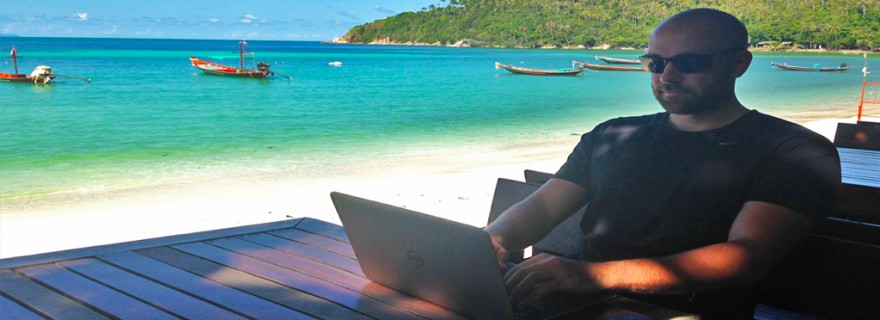
8. I have embraced minimalism (to an extent)
It is not the man who has too little, but the man who craves more, that is poor. – Seneca
Before taking off on my first long-term trip, I sold my car, got rid of my apartment, disconnected every service, and put my stuff in storage. Everything I needed to live and work could be carried on my back. I felt liberated.
Once the trip ended, I went to get my stuff from storage. I slid open the door and was disgusted. I realized I had a mini-house for my stuff, whose only function was to collect dust. Being separated from everything made me realize how much I didn’t need it. Taking a few hours to load it all into a moving truck further reinforced my desire to go back to my simpler vagabond life from a few weeks ago.
I have kept that memory and embraced a minimalism perspective ever since. I can’t exactly call myself a minimalist (sorry, no tiny house yet), but I consume and own a lot less stuff now. I’m on a constant crusade against my material possessions and excesses. I’ve become a more conscious and intentional consumer. My life is less cluttered and stressful. My mind feels freer to focus on what really matters. I try to focus my desires solely on relationships, experiences, and creative pursuits.
Minimalism is a tool that can assist you in finding freedom. Freedom from fear. Freedom from worry. Freedom from overwhelm. Freedom from guilt. Freedom from depression. Freedom from the trappings of the consumer culture we’ve built our lives around. Real freedom.
– The Minimalists
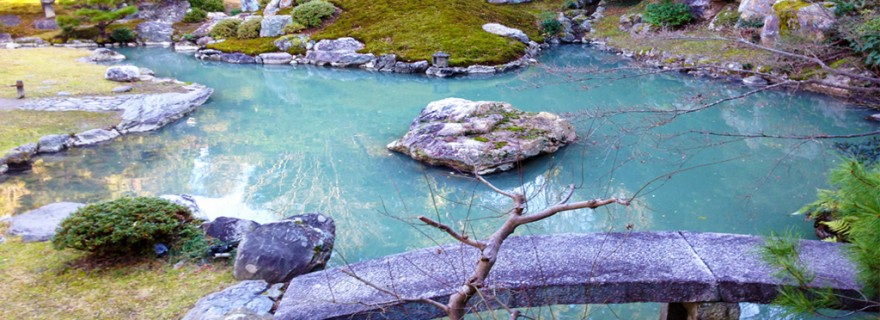
9. I am more comfortable being uncomfortable
Of all the skills I’ve learned in the past 7 years of changing my life, one skill stands out: Learning to be comfortable with discomfort. If you learn this skill, you can master pretty much anything. – Leo Babauta, Zen Habits
Nearly all significant personal growth comes out of discomfort. Life is often lived to avoid the uncomfortable and painful, but it’s the very thing that molds us and what we eventually credit for the good that comes after.
Creating a habit of embracing and overcoming the uncomfortable – both physical and mental – makes us resilient and alters our perspective. There are many ways to do this, such as leading difficult work projects or training for a marathon, but travel – particularly in the developing world – has a unique way of forcing you to quickly adapt to the uncomfortable every day.
A few recent examples of discomfort include: riding for 8 hours in the African heat in a 12-seater van, while squeezed in with 20 people, dozens of suitcases, 3 chickens, and several pounds of raw fish; spending time in some of the world’s poorest slums; being the only Westerner in a city and attracting unwanted attention because of it; living without AC or hot water; week long hiking expeditions; sleeping on floors; not speaking the same language as everyone around; arguing with corrupt police officers about bribes; crossing a land border and negotiating with the only remaining taxi driver who’s trying to rip you off; dealing with extreme inefficiency and bureaucracy; getting robbed; being regularly interrogated by security forces who find me suspicious.
I have become sensitized to many of these physical and mental discomforts. It has changed my perspective and made me much more resilient, confident, and gracious. Normal inconveniences are put into perspective. It takes a lot for me to complain, feel overwhelmed, feel uncomfortable, or feel the urge to quit something difficult. The ability to be comfortable being uncomfortable has been one of my most useful skills.
10. I know it’s possible to change the world
Never doubt that a small group of thoughtful committed citizens can change the world. Indeed, it is the only thing that ever has. – Margaret Mead
I’m constantly inspired by the selfless actions and generosity by so many nonprofits, philanthropists, NGOs, and missionaries around the world. I’ve learned that a small amount of money or effort can make a big difference in the developing world. It amazes me how many people without a budget or technical know-how, have seen a problem and simply said “I think I can do something.” They took whatever skill or resource they had (which was often only the desire to make an impact) and put it to work in the service of others to solve a problem that tangibly changed one or many lives.
One of the most personally inspiring examples of this was a small organization I met in Honduras. A little over 10 years ago, Henry and Frances visited La Colonia, a village of approximately 6,000 people. There was no source of clean water. People were walking miles to get water, and then were getting sick from it. Kids were dying of diarrhea and infections from drinking the dirty water. Henry and Frances thought that maybe they could do something to help. They took a leap of faith: sold their house, quit their jobs (even though they were only a few years from retirement), and moved to Honduras. They figured out how to build a well. Fueled by the desire to do more, they built two more wells and spent the next few years connecting PVC pipes until every house in the village had access to clean, running water. Their service inspired TripScout and this blog’s community to also step up and build the kids in the village a computer lab.
Seeing this first hand has caused me to spend a lot more time thinking about others and how I can help. I realized it doesn’t have to be big or complicated. A small amount of effort or money directed in the right way can transform the life of a person or a community, and by doing that, the world is changed.
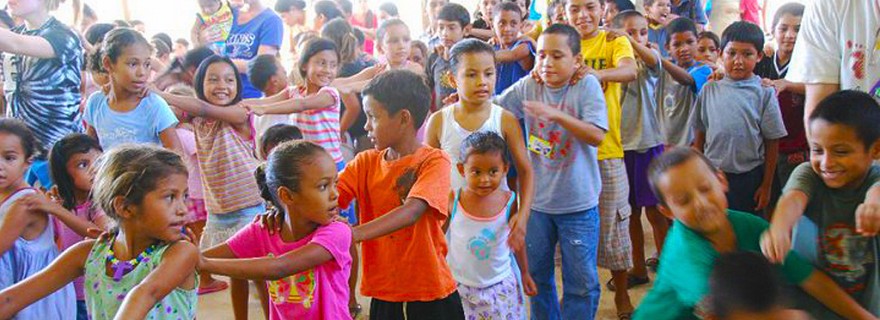
11. I am much more open minded
Everyone you will ever meet knows something you don’t. – Bill Nye
I hold very few opinions firmly these day. This wasn’t always the case, I used to be a lot surer in my beliefs. Travel had a way of changing that in me.
With my style of travel, I’ve been exposed to the opposing sides of many situations. I’ve spent time with both sides of military conflicts, the absurdly wealthy and those in extreme poverty, the social elite and those they’d view as anarchists, people from all religions, and the full spectrum of political views. I’m a naturally curious person that asks a lot of questions, and since I care a lot more about understanding others than being understood, I’m able to genuinely empathize with someone else’s perspective without feeling the need to argue or share my side of the story.
My most important realization was that our perspectives are based primarily on the circumstances of our birth. If put in someone else’s circumstances, it’s easy to see how someone would do the exact thing they are fighting against today. Each perspective was arrived at for a reason and there is always another side. Sometimes both sides can be right – or equally wrong. A new perspective or person you meet has the power to completely change your view and it’s important to be open to that instead of holding on to tightly to the need to feel “right.”
I’m not a relativist. I do believe there is a fundamental right and wrong. There’s no way to intelligently spin some of the modern problems throughout the world like equal rights for women, human trafficking, genital mutilation, or media censorship. I just believe the number of issues you can apply such strong views to is limited. It pains me to see people form opinions and politicians form policies about people they never met. People advocate immigration policies without ever spending time with immigrants or refugees. People fight against social programs without knowing the poor. People advocate for war without knowing the families on the other side. Unpopular and hard choices will still have to be made, but the decision should hurt. It should come from a perspective of empathy and an understanding of who it will impact the most.
I try to ask a lot more questions than I give answers. I don’t assume you’re any better or worse than me if you think differently. Whenever I form an opinion, I ask myself what assumptions are behind my perspective and if I’d feel the same way if I had completely different circumstances. Most importantly, I know my future self will look back and be embarrassed by some of the things I think and say today.
“The less people know, the more stubbornly they know it.”
– Osho
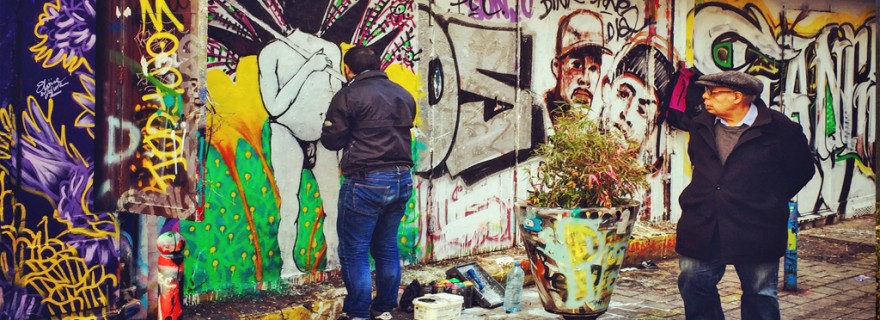
I hope you enjoyed my life lessons from travel. Please share with an aspiring traveler or a traveling friend who you know can relate. You can also follow me on Instagram or sign up for my free weekly digest about ways to travel the world, build a successful business or career, and make a difference at the same time:
Error: No feed found.
Please go to the Instagram Feed settings page to create a feed.
Life lessons from travel

